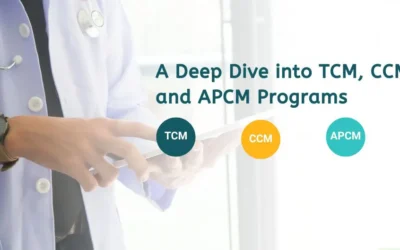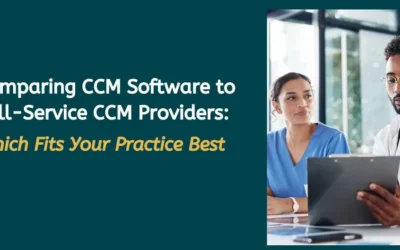Using patient engagement strategies requires intentional action, but the benefits are significant. People engaged in their care usually follow care plans, control their chronic health problems well, and stay in touch with their doctors. When you start focusing on...
Home //
Latest Blogs
Advance Primary Care Management (APCM) and Who Can Bill For It
Advanced Primary Care Management (APCM), which started in 2025, is the latest care management program from CMS. Unlike older care management plans, it supports every Medicare beneficiary, irrespective of how many chronic conditions they have. As APCM is just starting,...
A Deep Dive into TCM, CCM, and APCM Programs
Transitional Care Management (TCM) is a service that allows Medicare to pay for help given to a person transitioning from a hospital to their home. TCM strives to prevent patients from being readmitted in the first 30 days after they leave the hospital. At this point,...
Ways to Increase Patient Retention with CCM
Patient retention occurs when patients go to the same provider several times for care during their healthcare journey. Patient retention is what makes a healthcare practice convert a new patient into a loyal patient. Patient retention is one of the top measures of...
Effective Arthritis Management with CCM
Annual treatment of Rheumatoid Arthritis by medication amounts to more than $2,700 for patients and can reach 29.6% of total prescription expenses. Multiple benefits arise from chronic care management which improves the healthy lifespan of arthritis patients. Through...
Essentials and Strategies of Care Coordination for Effective Healthcare Management
The collaborative care organization and delivery method form the basis of care coordination. The system promotes clear communication among all providers who care for a patient to deliver high-quality care on time. Under this patient-centered healthcare model,...
Comparing CCM Software to Full-Service CCM Providers: Which Fits Your Practice Best
The healthcare providers who work with CCM companies gain an extra revenue stream through their partnership. The enrollment potential for Chronic Care Management services among Medicare patients reaches 82%, so most medical practices encounter substantial participant...
6 Manageable Risk Factors for Chronic Illness
The combination of these factors makes patients vulnerable to developing hypertension and chronic depression or diabetes. Patients who modify their lifestyles achieve better health outcomes and a decreased probability of developing severe health issues. 1. Poor Diet ...
How Technology is Revolutionizing Rural Healthcare Through CCM and RPM
A 2024 Journal of the American College of Cardiology report reveals that cardiologists are absent from almost 50% of all U.S. counties. The majority of rural communities face the biggest challenge because they must travel distances exceeding 85 miles to access...
Effective Strategies for Chronic Care Management and Remote Patient Monitoring
The CDC reports that six out of ten Americans suffer from at least one persistent health condition. Therefore, practices need to dedicate numerous hours weekly to condition management and documentation work that satisfies Medicare reimbursement standards.Understanding...
Comprehensive Patient Care: Management of Multiple Chronic Conditions
Because of MCC requirements, healthcare providers must address both clinical and non-clinical risk factors when delivering effective care. Patient-centered treatment needs to analyze Social Determinants of Health (SDOH) factors, including transportation and healthcare...
The Evolving Future of Chronic Care Management
Telehealth, along with remote patient monitoring (RPM), has transformed how healthcare professionals deliver their services to patients. Digital health services now enjoy skyrocketing demand from healthcare organizations, physicians, and their patients and family...












